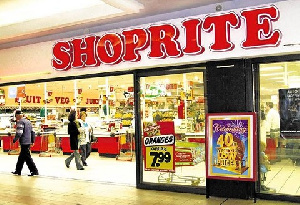 It is observed that all the branches of Shoprite do not accept mobile money transactions
It is observed that all the branches of Shoprite do not accept mobile money transactions
Leading retail outlet Shoprite Ghana has yet to include mobile money as one of its payment options, as customers who wish to use the payment platform are forced to withdraw money from an agent and pay in cash, the B&FT has gathered.
The actions of the South African retailer’s domestic arm presents cause for concern, especially at a time when businesses globally have rapidly adopted digital payment solutions in response to the ongoing pandemic – with local businesses particularly encouraged to do so by the Bank of Ghana (BoG).
When one of the supervisors on duty (identity held anonymous) at the Accra Mall branch was asked why the shop rejects payments through the mobile money platform, she said it was an order from above.
Efforts by our reporters to solicit the rationale behind this directive from management proved futile, as those who could speak to the issue declined to do so. Attempts to reach management hit a further snag, as a front-desk officer took the contact details of our reporters with a promise to respond on the subject.
However, the promise remained unfulfilled for several days; and when the B&FT reached out to her via telephone she was emphatic that management had declined to grant any interviews or respond to the subject.
To ensure the incident was not an isolated one, the B&FT made further checks at the Osu and West Hills branches of Shoprite – where the story was the same.
A Shoprite customer’s experience
A customer at the West Hills branch of Shoprite, Kwabena Adu Adjei who had a similar experience two weeks ago, said he got in a near-embarrassment situation due to the retailer’s policy of not accepting mobile money; an incident that has pushed him not to shop with Shoprite until there is a change in its stance.
Narrating his ordeal to the B&FT, he said: “When we walked into the mall, my wife asked if I did not have enough cash on me, but I was dismissive as I knew what I had on my MoMo wallet was enough for our groceries and even more. Once we got to the counter, we were told that Shoprite does not accept mobile money. To say we were embarrassed as we scrambled for cash is a gross understatement.
“From contemplating leaving all we had in our basket – including a yellow umbrella that my daughter desperately wanted – to looking up how many notes we had, the entire experience was terrible. But the depth of it all was when the cashier told me, unashamedly, to go to a competitor – Game Shop – to cash out and come and pay.”
He added that when he enquired about the likelihood of mobile money being introduced as a payment option, he was told it is being ‘considered’. Consequently, he had decided not to patronize the South African retailer until there is a change in the situation.
What competitors are doing
To get a better appreciation of how widespread this position is within the retail space, the B&FT visited a similar-sized establishment, Melcom Ghana.
Checks at Melcom Plus in North-Kaneshie and other branches at La, Adenta, Frafraha and Madina showed a plethora of digital payment options – with mobile money being the most prominent. A similar emphasis on mobile money payments was observed at another large-scale retailer – Citydia.
Mobile Money adoption rate
Market leader MTN launched its mobile money platform in 2009, with its merchant-focused MoMo Pay coming in 2017.
Figures released by the telecommunication company for full-year 2020 showed a rise in active MoMo users by 1.5 million to a total of 10.6 million, and an additional 53,000 agents during the year to make a total of 206,000 nationwide.
The ubiquitous nature of mobile money adoption is best captured by recent data released by the BoG, which show that the value of mobile money transactions is approximately three times that of all the other digital payment platforms in the country combined – hitting a transactional value of GH¢89.1billion as of June this year. This represents a 96.6 percent jump from the same period last year.